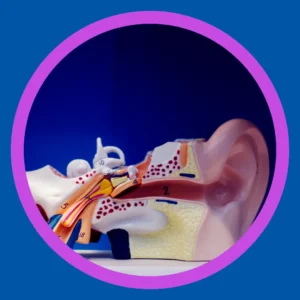Common Medications That Can Affect Your Hearing
Many people know that age affects hearing. But few realize that medications can, too. Some common medications damage the ear’s delicate structures. These are known as ototoxic medications. They can lead to temporary or permanent hearing loss. They can also trigger tinnitus or balance problems.
In this article, we’ll explain how common medications affect your hearing. We’ll also explore symptoms, risks, and what you can do to protect your ears.

What Does “Ototoxic” Mean?
“Ototoxic” means toxic to the ear. These drugs damage your inner ear’s hair cells. These cells help you hear and keep your balance. Ototoxicity can lead to hearing loss, tinnitus, vertigo, or unsteadiness. Over 200 drugs have ototoxic potential.
The risk increases with higher doses and longer use. Mixing multiple ototoxic drugs makes hearing loss more likely. Some people experience symptoms quickly. Others may not notice signs for weeks or months.
Symptoms of Ototoxicity
Ototoxicity doesn’t look the same for everyone. Symptoms may begin suddenly or develop slowly. Some resolve once you stop the medication. Others may cause permanent hearing loss. Be alert for:
- Ringing in one or both ears (tinnitus)
- Dizziness, spinning, or vertigo
- Unsteadiness or difficulty walking in the dark
- Hearing muffled sounds or needing to increase the TV volume
- Feeling pressure in the ears
- Loss of balance or nausea
Report symptoms right away. Early action can help protect your hearing.
Find out how diet can also affect your tinnitus risk.
Drug Categories Linked to Hearing Loss
Several drug classes are linked to hearing loss and balance issues. These include antibiotics, pain relievers, diuretics, chemotherapy drugs, and more. Let’s take a closer look.

1. Pain Relievers You Can Buy Without a Prescription
Over-the-counter painkillers are widely used and often seem harmless. But when taken in high doses over long periods, some may cause hearing damage.
Common culprits include:
- Aspirin (especially in high doses over 8 tablets daily)
- Acetaminophen (Tylenol)
- NSAIDs like ibuprofen (Advil) and naproxen (Aleve)
A large study found that men under 60 who regularly used these drugs were more likely to develop hearing loss. The same pattern was later found in women.
Pregnant women who use OTC pain relievers daily may also increase the risk of congenital hearing loss in newborns.
2. Prescription Pain Medications (Opioids)
Opioids are powerful painkillers. But they also pose hearing risks. These include:
- Oxycodone (OxyContin)
- Hydrocodone (Vicodin)
- Fentanyl
- Morphine
- Methadone
- Heroin (illicit use)
Hearing loss linked to opioids may happen suddenly. In some overdose cases, the loss was permanent. Always take opioids exactly as prescribed and discuss alternatives when possible.
3. Antibiotics That May Harm Hearing
Antibiotics treat bacterial infections. Some types are known to be ototoxic, especially when given through IV or used in large doses.
Aminoglycosides are the most well-known. These include:
- Gentamicin
- Amikacin
- Neomycin
- Tobramycin
- Streptomycin
These drugs are often reserved for severe infections like meningitis or sepsis. They’re more dangerous for newborns and people with kidney problems.
Macrolide antibiotics may also affect hearing, especially when used at high doses:
- Azithromycin
- Clarithromycin
- Erythromycin
Vancomycin is another powerful antibiotic with ototoxic potential. Intravenous use increases risk. Some ear drops also contain ototoxic ingredients. These should not be used if the eardrum is damaged.
Hearing loss may show up weeks or months after the last dose. In some cases, the damage is permanent.
4. Chemotherapy Medications
Chemotherapy drugs help fight cancer—but some affect hearing. Cisplatin is the most well-known. It’s used to treat:
- Ovarian cancer
- Testicular cancer
- Bladder cancer
- Some head and neck cancers
Cisplatin damages inner ear cells that detect sound and control balance. Up to 50% of patients who receive cisplatin experience hearing loss. Other platinum-based drugs include carboplatin and oxaliplatin.
Hearing loss may be permanent, especially in children. Oncologists now monitor hearing during treatment. They may adjust doses to reduce ototoxic effects.
5. Loop Diuretics
Loop diuretics are prescribed to remove excess fluid from the body. They treat conditions like:
- Heart failure
- High blood pressure
- Kidney disease
Examples include:
- Furosemide (Lasix)
- Bumetanide
- Ethacrynic acid
Hearing loss from loop diuretics is usually temporary. But when given in high doses or combined with other ototoxic drugs, permanent damage is possible.
These medications may increase inner ear membrane permeability. That allows harmful substances to reach the cochlea.
6. Erectile Dysfunction Medications
Phosphodiesterase-5 (PDE-5) inhibitors treat erectile dysfunction. These include:
- Viagra (sildenafil)
- Cialis (tadalafil)
- Levitra (vardenafil)
- Stendra (avanafil)
Though rare, some people experience sudden hearing loss after taking these drugs. Report any hearing changes to your hearing care provider immediately.
7. Anti-Malarials and Autoimmune Medications
Drugs like chloroquine and hydroxychloroquine (Plaquenil) treat malaria and autoimmune conditions. Some people experience:
- Temporary tinnitus
- Sudden hearing loss
- Balance issues
These symptoms usually improve after stopping the medication. But some reports document permanent effects.
8. GLP-1 Agonists for Diabetes and Weight Loss
Newer medications like Ozempic, Mounjaro, and Zepbound help manage diabetes and weight. Most users report no hearing changes. However, rare complaints have surfaced online.
Although there’s no proven connection, report any ear symptoms to your hearing care provider. Staying alert helps detect issues early.
9. Substances That Aren’t Medications But Still Harm Hearing
Some non-medications affect hearing too. These include:
- Nicotine (reduces blood flow to the inner ear)
- Alcohol (can worsen balance and hearing symptoms)
- Heavy metals like mercury or lead (known ear toxins)
Avoiding these substances supports hearing health and prevents complications during medication use.
Factors That Increase Risk of Ototoxicity
Some people are more vulnerable to ototoxic effects than others. Risk factors include:
- Advanced age
- Poor kidney function
- Frequent exposure to loud noises
- Taking multiple ototoxic medications at once
- A family history of hearing loss
- Long treatment duration or high drug doses
If you fall into any of these groups, request a hearing baseline test before starting treatment.
Understand the link between stress and hearing loss.
How to Protect Your Hearing While Taking Medication
You can’t always avoid necessary medications. But you can take steps to reduce risk.
Protective tips include:
- Share a complete medication list with your hearing care provider
- Avoid combining multiple high-risk drugs
- Monitor your hearing closely during treatment
- Use hearing protection in noisy environments
- Stay hydrated and manage blood sugar
- Avoid smoking and limit alcohol use
These habits help preserve hearing during treatment.
Discover whether ear candling can help.
What to Do If You Notice Hearing Changes
Don’t wait. If you notice hearing loss, ringing, or balance issues after starting new common medications:
- Contact your prescribing doctor
- Call your hearing care provider
- Never stop medication without professional guidance
- Request a hearing test as soon as possible
Early detection gives you the best chance of preserving hearing.

How Stanford Hearing Can Help
At Stanford Hearing, we help patients protect and monitor their hearing. If you’re starting a medication with ototoxic risks, our team can provide:
- Baseline hearing evaluations
- Ongoing hearing monitoring
- Counseling on hearing-safe medications
- Recommendations for protective strategies
- Help managing hearing loss symptoms
Our experienced hearing care providers use the latest technology and personalized care plans. We’re here to help you keep your hearing healthy, even when medications are necessary.
Concerned about your common medications and your hearing?
Schedule a consultation with Stanford Hearing today. Let’s work together to keep your hearing strong and steady.
